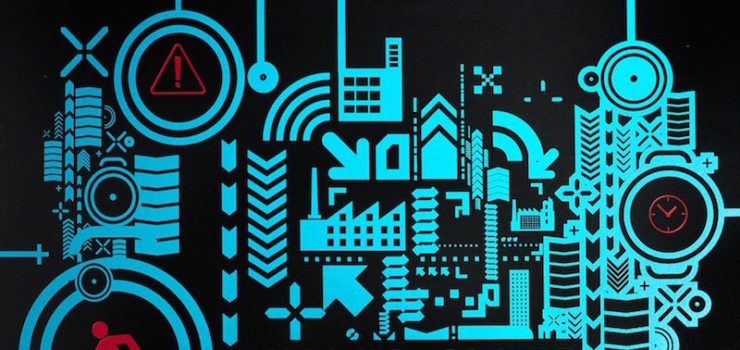What questions do SFF authors ask themselves when creating a futurescape, and what worldbuilding considerations do they make? Tor.com has assembled a roundtable of authors with exciting new books out this year to give you a look behind the scenes of their writing processes. We asked them several questions to start with, and then gave them control of the table to ask their own questions. Their replies are as varied as their work, and their worlds.
Participating today are Peng Shepherd (The Book of M), Malka Older (Infomocracy / The Centenal Cycle), Tade Thompson (Rosewater, The Murders of Molly Southbourne), Lauren C. Teffeau (Implanted), and Mike Chen (Here and Now and Then).
Fran Wilde: What is the most important thing to keep in mind when writing / worldbuilding in near future or distant technical future worlds?
Tade Thompson: To me, that would be using worldbuilding to ground the reader and characters in place, but to avoid piling it on in a fit of “isn’t this cool?” or “hey, wouldn’t it be great if…?”. The worldbuilding should serve the story and while I may know everything about the place/time/setting, I will only give the reader enough to be able to follow the story and extrapolate. I’m not a fan of showy worldbuilding. You know how in some game engines the 3D world is rendered just before the player character arrives, and it decides just how much to render? That’s sometimes what I feel worldbuilding should be like. The grounding should, of course, let us know how this future world deviates from ours.
I’d like to add here that a recent example of excellent worldbuilding (in my view) is The Murderbot Diaries by Martha Wells. The balance is perfect.
Mike Chen: I think the most important thing is that the world needs rules established, and then the worldbuilding has to follow those rules. It’s okay to have fantastical elements as long as they don’t do anything to contradict something that’s previously established—any conflict or contradiction will cause the reader to pause and go “Wait, I thought they couldn’t do that?” and that’s gonna at best create confusion, at worst lose the reader and cause them to rage quit the book.
Also, the rules should be established organically and not in a giant info dump!
Lauren C. Teffeau: For me, it’s finding the right entry point into a story world. In those crucial opening scenes you’re not only establishing the rules, but you’re also setting up the reader’s expectations just by virtue of it being their first glimpse of your world, now destined to color everything that comes after. When deciding how to open a story, I try to create scenes that not only introduce my main character in an engaging way and portray some driving action approaching a plot, but also introduce at least two or more aspects of my world that help ground the reader in the story (good) and hint at cool or intriguing aspects to come (better). Getting the reader oriented so they’ll tag along for the whole ride is best of all.
Fran Wilde: It’s been said that Connie Willis’ Blackout and All Clear might have been radically different with cellphones in the mix. What one technology worried or frustrated you the most while you write in the near/far future?
Buy the Book
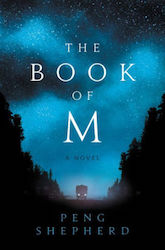

The Book of M
Peng Shepherd: Cars! My first novel, The Book of M, is set about two years after an apocalyptic event, and partway through the first draft, I realized that all these characters who were zipping back and forth across the nightmarish landscape in their cars wouldn’t be able to get very far—it turns out that gasoline only lasts for a year or two before it goes bad. A few key characters do find working vehicles (won’t explain why for spoiler reasons), but I had to go back and strip out most of the rest from the story and replace the cars with horses, walking, or other more creative modes of transport.
Mike Chen: Writing a time travel book, I really worried about making the method of time travel grounded enough in reality so that it didn’t feel too hand-wavey. I have an engineering degree and part of that included taking a course in quantum physics, and we spent one week of the course talking about the energy and math behind theoretical time travel. I included some of that in my theoretical science, and I also looked at various practical elements—how could you identify safe geographic points, is it harder on the human body to go backward or forward, does the energy required limit the amount you could jump back, etc. That last point, by the way, sealed off a lot of great potential Grandfather Paradox loopholes, so it was a great writer way out.
Tade Thompson: My main problem was tech catching up with what I was putting in the book. I had soft, subdermal polymer-based mobile phones and elevators moving sideways and cyborg-drones that looked like raptors. The first two are already here. The longer the publication delays, the worse it gets for near-future fiction writers. Maybe that means I should fling my future much further forward.
Malka Older: I was inspired by a line in Austin Grossman’s YOU and by watching some Japanese action movies, which involved crossbows, explosions, tonfa, and lots of other ridiculous stuff but no firearms, to think up a technology that would render guns ineffective. Maybe unfortunately, I left a loophole in the form of plastic guns, and I found that those ended up playing more of a role than I wanted them to in the sequels, demonstrating how hard it is to get rid of a technology we are unfortunately very accustomed to.
Lauren C. Teffeau: My biggest fear is always that the technical advances I choose to explore in my work become too mainstream by the time those stories get published. I don’t want readers to read something of mine and feel like they’ve been there, done that. At the same time, I think near science fiction is a crucial forum for analyzing the implications of new and current technologies and, quite frankly, asking better of them. In the rush to get new products to market or out-compute our geopolitical rivals, I think we run the risk of not fully vetting anything, doomed to chase shiny unicorn projects instead of putting in the work to improve what we already have. The rate of change these days seems to preclude any sort of contemplation on how the latest, greatest technologies will affect us. Near science fiction writers are performing the emotional labor for our tech sector, but it sometimes feels like we are trees falling in the forest.
Wow, that got dark quick. Maybe just give your closest futurist a hug. It’s been a rough couple of years…
Fran Wilde: We build future worlds for today’s audiences, often with cautionary or inspiring settings in mind. Which do you write and which do you read? Examples?
Buy the Book
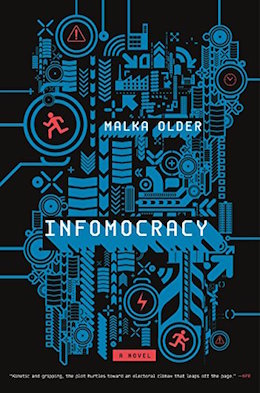

Infomocracy
Malka Older: I tend to err on the inspiring side, both reading and writing, mainly because the cautionary parts seem very present to me, and I’d rather not think about them more than I already have to. But not everyone’s brain works the same, and I know that cautionary works for a lot of people, both as a warning, and as a way of expurgating some of those terrifying nightmares in a useful way. We need as many different futures as we can get, both to warn us off and to offer us new alternatives.
Mike Chen: Being someone who writes for geek culture sites, I’ve seen a LOT of infighting over the past year about diversity and inclusion in big franchises—always from a vocal minority (also, never read the comments). For my own material, I see the best way to combat this is to simply portray the future I want to see. That means that for scenes taking place a century into the future, the social norms are things that I want to see: LGBT couples are married with children and it’s no big deal, surnames don’t reflect ethnic backgrounds because mixed-race couples have had generations to have children, and in general, people aren’t jerks. This may be a bit of Star Trek: The Next Generation optimism, but I think the more these things are normalized in fiction, the more they’ll be accepted in our world today. It’s a self-fulfilling prophecy of the good kind.
Tade Thompson: Neither. I have a more nihilistic, anarchic bent. I build a future into which I project stories, stories that revolve around characters, not their surroundings. I say, let the narrative go wherever it wants. I have no interest in being inspiring or cautionary. If the character is dark or if dark things happen, then that’s what we get. Sometimes, it goes the other way. My reading follows the same trajectory. Fiction that is Trying to Tell Me Something bores me to tears and I’m likely to fling it across the room.
Peng Shepherd: I’m with Tade on this. I’ve never been able to write to a theme or preconceived message, or read fiction that seems like it’s doing that either. It just ends up feeling artificial and usually boring. Plus, I think all stories set in the future contain both inspirational and cautionary elements anyway—what is good for one character or group may be very bad for another. I think that reality is really important.
Lauren C. Teffeau: I admit to writing science fiction with one of my goals being to caution people of all the unintended consequences out there. The problem is for so long the field has been sounding the alarm on lots of issues and envisioning worst-case scenarios, real solutions often get overlooked in the spectacle. So I try hard to present solutions to whatever broken thing I’m exploring in my work, and I think it’s even more important to do so now. Doesn’t mean it’s easy or some kind of cure-all, but I do think there needs be hope somewhere in a story. The spoonful of sugar to help the medicine go down.
Peng Shepherd: When creating future or alien technology, especially types that the characters (or readers) don’t fully understand, it can sometimes feel almost indistinguishable from magic, which is a very different thing. How do you approach writing about such imagined tech so that it still feels like science fiction and not fantasy?
Buy the Book
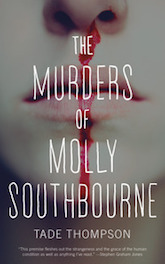

The Murders of Molly Southbourne
Tade Thompson: I follow Mary Poppins’ rule: Never explain. Which is not true. I do explain, but if something is really weird, I’m fine not explaining myself even if I can.
Malka Older: I really love this question, because I think the line between technology and magic is a very fine one. Most of our lives now would seem like magic to people even a hundred years ago, and yet we accept it as technology even though most of us as individuals aren’t able to understand or explain the technology behind it. So when I’m writing new technology into a book, I just try to give it a few of those trappings that make us accept things as technology. Someone knows how it works; it builds off of existing technology; use is accessible to more or less everyone (explicit accessibility issues can make technology feel more realistic, but there’s no secret initiation or inherent ability that some have and others do not).
Mike Chen: It really comes down to internal logic. What is the resource consumed? What are the limitations? What is the cause and effect? As long as there is a weighted cost to the tech, I feel like it works. It also helps to have some basis in real-world science. Star Trek, particularly the TNG era, always did a great job of this. For example, they mention the Heisenberg Compensator which sounds sciency enough for the everyday viewer but it’s rooted in a principle of particle physics. When you look at it, it’s a hand-wavey thing they mention in the script but it acknowledges a scientific conflict with a piece of their imaginary tech, and that feels very grounding.
Lauren C. Teffeau: I love playing with the fuzzy distinctions between magic and technology. As far as showing the reader where on the continuum story elements fall, the POV character’s treatment of them can provide a lot of information without slowing the story down with exposition. How novel is the technology? What is its history in the world? Are there experts, as Malka points out, who understand how it works, even if they aren’t evenly distributed? I think there’s also an onus on the writer to ensure the technology feels like a natural extension of the worldbuilding rules already established. Otherwise, in my opinion, the technology can feel more like a deus ex machina magical MacGuffin.
Malka Older: How much of a pass do you give yourself in terms of not knowing how we get from here (IRL present) to there (your fictional future)?
Peng Shepherd: As a reader, I’m really easy to convince. Give me the tiniest inkling of explanation, and I buy it, disbelief is suspended, I’m with you for the ride. This probably comes through in my writing, too. To me, it’s more important for the fictional future to feel genuinely, earnestly imagined than for every step of the evolution to be presented.
Tade Thompson: Same as Peng, really. For me, suspension of disbelief lies more in the characters than the worldbuilding. I cringe at fiction claiming to portray elements of my specialist areas and doing it wrong, but it doesn’t throw me out of the story as long as the characters are strong. I can’t watch most medical dramas, for example, and crime fiction involving serial killers or multiple personalities…gah! But I don’t mind some of the extrapolations as long as the characters in the narrative are compelling. So, as far as the evolution of tech that is in my stories, I totally give myself a pass. If folks want information about a specialty, there are a number of journals that can scratch this itch. I’m more interested in the What If as it intersects with humans, what it means to us as a group, how it affects our culture and our individual psychology.
Lauren C. Teffeau: It depends on the scope of the story I’m trying to tell. For some, the less intrusive the futuristic elements are, the better, especially when I’m doing a character piece or only focused on one aspect instead of a whole milieu. Other times, you really need that rigor—either for fleshing out your storyworld in a convincing way or as a behind-the-scenes writing exercise that may never be formally included in your book but provides the internal consistency necessary for plotting out your story.
Lauren C. Teffeau: When writing about the future, what aspects are of most interest to you, and how do you track the butterfly effect your extrapolations create in other areas of your storyworld?
Buy the Book
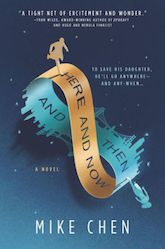

Here And Now And Then
Mike Chen: There isn’t one particular area I’m interested in. I wind up finding a core story conflict that is interesting first, then the setting for it, then going backwards from there. The butterfly effect into other elements winds up being an organic part of the writing process, as ideas come to me during drafting—either because they naturally fit or because the tech would really help move the scene along. I’m a big spreadsheet maker, though, so usually after a first draft, I’ll sit down and make lists of worldbuilding elements. Then during a re-read, I’ll find places to sprinkle them into the background to help round the story out and ground it more in reality.
Lauren C. Teffeau: I often focus on connectivity and communication. It’s a reflection of my academic interests and the projects I was involved in as a graduate student and later on as university researcher, particularly the role of digital resources. Even if that’s not the main thrust of my story, those lenses often prove useful in understanding my storyworld and extrapolating from there. My anchor, if you will, even if my story inspirations and research are wider-ranging. As far as tracking the changes as they compound, it can get wild and wooly, and I tend to let things that aren’t of interest to me or my story drop off just to simplify things a bit.
Mike Chen: Worldbuilding feels more real when you see the little details outside of the flying cars and holograms. How did you come up with these types of details and what are some of your favorites from your work?
Peng Shepherd: For me, what often makes a story feel more real is the hygiene stuff—bathing, brushing teeth, washing clothes. All of that is so boring, but so inescapable, in our current lives, so it can really make a fictional setting feel lived in, whether it’s set in a destroyed world or a futuristic one. There’s a scene in The Book of M about pads and tampons, when a group of women hiding on a mountain realize they’re all going to have their periods at some point very soon, but not expecting to have become trapped there, they all only brought one or two extras, and another scene about a married couple wanting to be intimate while fast running out of soap, but are too embarrassed to talk about “going more natural.” A lot of the fun of post-apocalyptic stories is the danger and adventure, but sometimes the human side can get lost in all of that, and I really wanted to bring a few of those moments to the forefront.
Malka Older: This is one of my favorite parts of writing science fiction, and a lot of my little details came up during the long germination and editing process, where I would just think “oh that would be cool,” “oh that would make sense,” and throw it in totally unrelated to plot (it’s more frustrating when I get those now, after everything has gone to press; I need an evolving web site or other location for my world). I put in a lot about cosmetics, beauty, and fashion, even though that’s not something I think a lot about or spend a lot of time on myself, but I find it really interesting how ideas of beauty and mode change over time, and because a lot of money goes into those industries you can imagine a lot of fun new technologies related to them.
Tade Thompson: The glitches and the crime. I think that we all welcome new technology, but we’re experienced enough now to realise that this shiny new thing isn’t going to work all the time, and that if you invent it, some criminal will find a way to exploit it. In my Rosewater books everybody is supposed to have RFID chips, but there are ways of ghosting them, and, Nigeria being what it is, the supplier can sometimes use toxic components resulting in mass death. To me, that is what links the reader’s own experience to the futuristic tech. I don’t think there’s any point just having tech for the sake of it. It must touch the reader at home in some way, otherwise it’s just pretty words signifying nothing. Of course, not all aspects of a narrative are aimed at all readers.
Lauren C. Teffeau: These are always so frustrating for me to come up with but so rewarding when they’re right. Sometimes the perfect detail is a bolt from the blue. Others, I labor over or, more accurately, procrastinate long enough that desperation is its own incentive to come up with a detail that just might fit the world. In those cases, “good enough” can be the building blocks to something great. I’ve learned to trust the process, to give myself time to let the world tell me how to present it to readers, because forcing it is painful for everyone involved.
Tade Thompson: Do we pay too much attention to worldbuilding in genre?
Buy the Book
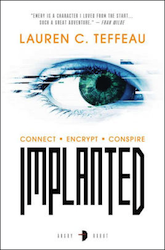

Implanted
Malka Older: I’m going to flip that around and say we should pay more attention to worldbuilding in non-genre. Whatever story you’re writing (except maybe the most experimental), it’s set in a place that you can’t assume your reader is familiar with—even if it’s a real city, say, or a family home, your reader might be coming from a completely different context. And of course the “real city” in the book is not the same as the IRL city in any sense—it is frozen at a certain point in time and perspective. So while there may be less invention involved, the technical problems of how much the reader needs to know to feel like they’re there and understand the ways the setting affects the story without the setting overwhelming the story are the same.
Peng Shepherd: Nope! (Can I just leave my answer at that?) More seriously, well done worldbuilding is one of the best parts of reading genre. If I’m going to go to Mars, or to the year 3000, or to an all-robot colony, or an island governed by super intelligent, science-enhanced birds, I don’t just want the plot—I want to experience the details!
Mike Chen: I always think there’s a balance to be made. I’m the type of reader that wants to always have the character and plot drive the story forward, so info-dumping a la Tolkien takes me out of the story. I love that kind of detail but I think it can hit a level where it belongs in supplementary material. I see the litmus test as this: does the worldbuilding feel organic or does it feel like you’re reading an RPG manual? If it’s the latter, then it’s gotta be cut or redistributed elsewhere.
Lauren C. Teffeau: Honestly, I’m not sure how I’d write if I wasn’t preoccupied with worldbuilding. There are so many fundamental story elements that can be filtered through my characters’ experiences that it’s too useful a tool to overlook in my arsenal. Historical writers must include telling details to create a period of time lost to human memory, the same skills SFF writers must employ even if our worlds are figments of our imagination instead of figments passed down through the ages. I’d say that even writers dealing solely in contemporary settings subconsciously worldbuild, even if there are theoretically more people besides the author that share the same experience. SFF writers have simply formalized the activity, and that’s what makes it so rewarding.
Peng Shepherd was born and raised in Phoenix, Arizona, where she rode horses and trained in classical ballet. Her debut novel, The Book of M, was chosen as an Amazon “Best Science Fiction and Fantasy Books of the Year,” and has been featured on The Today Show, NPR On Point, and in The Guardian, io9 Gizmodo, Book Riot, and Elle Canada. She is a graduate of New York University’s M.F.A. in Creative Writing program and a winner of the Elizabeth George Foundation’s emerging writers grant. She can be found at her website or on Twitter @pengshepherd.
Malka Older’s science fiction political thriller Infomocracy was named one of the best books of 2016 by Kirkus, Book Riot, and the Washington Post. She is also the author of the sequels Null States (2017) and State Tectonics (2018), as well as of short fiction, poetry, and essays. Named Senior Fellow for Technology and Risk at the Carnegie Council for Ethics in International Affairs for 2015, she has more than a decade of field experience in humanitarian aid and development. Her doctoral work on the sociology of organizations at the Institut d’Études Politques de Paris (Sciences Po) explores the dynamics of post-disaster improvisation in governments using the cases of Hurricane Katrina and the Japan tsunami of 2011. Find out more at her website.
Tade Thompson lives and works in the south of England. His most recent books are Rosewater and The Murders of Molly Southbourne. He has been awarded the Golden Tentacle Award at the Kitsches (for his novel Making Wolf), and the inaugural Nommo Award for speculative fiction. His work has been nominated for the British Science Fiction Association award (twice), the British Fantasy Award, the Shirley Jackson Award, and the African Speculative Fiction Society Award (twice). He is a John W. Campbell award finalist. On Twitter, he is @tadethompson.
Mike Chen is a lifelong writer, from crafting fan fiction as a child to somehow getting paid for words as an adult. He has contributed to major geek culture websites (The Mary Sue, The Portalist), covered the NHL for mainstream media outlets, and ghostwritten corporate articles appearing in Forbes, Buzzfeed, Enterpreneur, and more. A member of SFWA and the Codex Writers group, Mike calls the San Francisco Bay Area home, where he can often be found playing video games and watching Doctor Who with his wife, daughter, and rescue animals. His debut novel Here and Now and Then is out January 2019 from Mira Books. For more info, visit his website or find him on Twitter @mikechenwriter.
Lauren C. Teffeau is a speculative fiction writer from New Mexico. When she was younger, she poked around in the back of wardrobes, tried to walk through mirrors, and always kept an eye out for secret passages, fairy rings, and messages from aliens. Now, she writes to cope with her ordinary existence. Besides the obligatory bachelor’s degree in English, she also holds a master’s degree in Mass Communication and spent a few years toiling as a researcher in academia. Implanted, out this August from Angry Robot, is her debut novel. To learn more, please visit her website.
Fran Wilde’s novels and short stories have been nominated for three Nebula awards and two Hugo awards, and include her Andre Norton- and Compton-Crook-winning debut novel, Updraft (Tor 2015), its sequels, Cloudbound (2016) and Horizon (2017), and the novelette “The Jewel and Her Lapidary” (Tor.com Publishing 2016). Her short stories appear in Asimov’s, Tor.com, Beneath Ceaseless Skies, Shimmer, Nature, and the 2017 Year’s Best Dark Fantasy and Horror. She writes for publications including The Washington Post, Tor.com, Clarkesworld, iO9.com, and GeekMom.com. You can find her on Twitter, Facebook, and at franwilde.net










